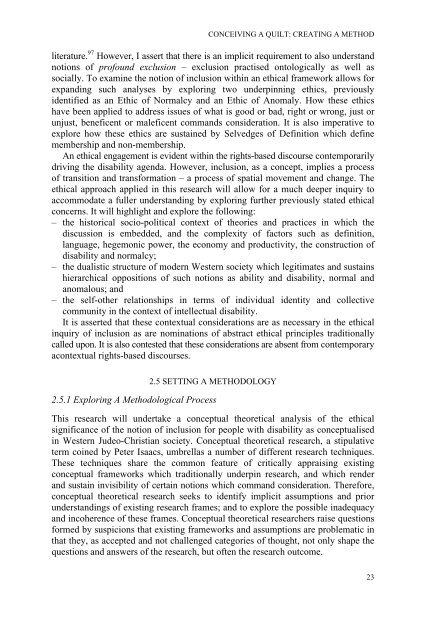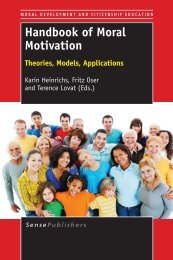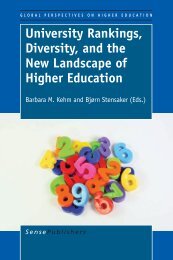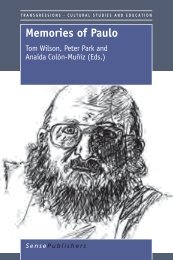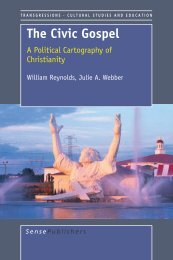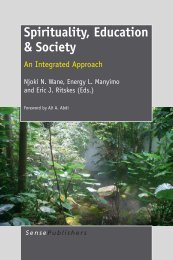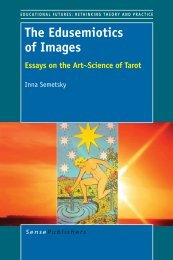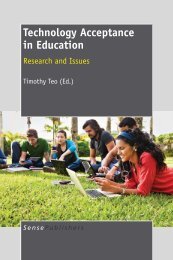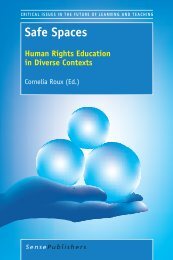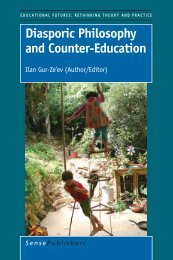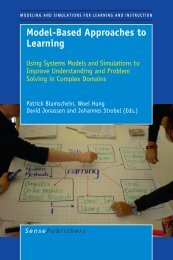Rupturing Concepts of Disability and Inclusion
Rupturing Concepts of Disability and Inclusion
Rupturing Concepts of Disability and Inclusion
You also want an ePaper? Increase the reach of your titles
YUMPU automatically turns print PDFs into web optimized ePapers that Google loves.
CONCEIVING A QUILT: CREATING A METHOD<br />
literature. 97 However, I assert that there is an implicit requirement to also underst<strong>and</strong><br />
notions <strong>of</strong> pr<strong>of</strong>ound exclusion – exclusion practised ontologically as well as<br />
socially. To examine the notion <strong>of</strong> inclusion within an ethical framework allows for<br />
exp<strong>and</strong>ing such analyses by exploring two underpinning ethics, previously<br />
identified as an Ethic <strong>of</strong> Normalcy <strong>and</strong> an Ethic <strong>of</strong> Anomaly. How these ethics<br />
have been applied to address issues <strong>of</strong> what is good or bad, right or wrong, just or<br />
unjust, beneficent or maleficent comm<strong>and</strong>s consideration. It is also imperative to<br />
explore how these ethics are sustained by Selvedges <strong>of</strong> Definition which define<br />
membership <strong>and</strong> non-membership.<br />
An ethical engagement is evident within the rights-based discourse contemporarily<br />
driving the disability agenda. However, inclusion, as a concept, implies a process<br />
<strong>of</strong> transition <strong>and</strong> transformation – a process <strong>of</strong> spatial movement <strong>and</strong> change. The<br />
ethical approach applied in this research will allow for a much deeper inquiry to<br />
accommodate a fuller underst<strong>and</strong>ing by exploring further previously stated ethical<br />
concerns. It will highlight <strong>and</strong> explore the following:<br />
– the historical socio-political context <strong>of</strong> theories <strong>and</strong> practices in which the<br />
discussion is embedded, <strong>and</strong> the complexity <strong>of</strong> factors such as definition,<br />
language, hegemonic power, the economy <strong>and</strong> productivity, the construction <strong>of</strong><br />
disability <strong>and</strong> normalcy;<br />
– the dualistic structure <strong>of</strong> modern Western society which legitimates <strong>and</strong> sustains<br />
hierarchical oppositions <strong>of</strong> such notions as ability <strong>and</strong> disability, normal <strong>and</strong><br />
anomalous; <strong>and</strong><br />
– the self-other relationships in terms <strong>of</strong> individual identity <strong>and</strong> collective<br />
community in the context <strong>of</strong> intellectual disability.<br />
It is asserted that these contextual considerations are as necessary in the ethical<br />
inquiry <strong>of</strong> inclusion as are nominations <strong>of</strong> abstract ethical principles traditionally<br />
called upon. It is also contested that these considerations are absent from contemporary<br />
acontextual rights-based discourses.<br />
2.5 SETTING A METHODOLOGY<br />
2.5.1 Exploring A Methodological Process<br />
This research will undertake a conceptual theoretical analysis <strong>of</strong> the ethical<br />
significance <strong>of</strong> the notion <strong>of</strong> inclusion for people with disability as conceptualised<br />
in Western Judeo-Christian society. Conceptual theoretical research, a stipulative<br />
term coined by Peter Isaacs, umbrellas a number <strong>of</strong> different research techniques.<br />
These techniques share the common feature <strong>of</strong> critically appraising existing<br />
conceptual frameworks which traditionally underpin research, <strong>and</strong> which render<br />
<strong>and</strong> sustain invisibility <strong>of</strong> certain notions which comm<strong>and</strong> consideration. Therefore,<br />
conceptual theoretical research seeks to identify implicit assumptions <strong>and</strong> prior<br />
underst<strong>and</strong>ings <strong>of</strong> existing research frames; <strong>and</strong> to explore the possible inadequacy<br />
<strong>and</strong> incoherence <strong>of</strong> these frames. Conceptual theoretical researchers raise questions<br />
formed by suspicions that existing frameworks <strong>and</strong> assumptions are problematic in<br />
that they, as accepted <strong>and</strong> not challenged categories <strong>of</strong> thought, not only shape the<br />
questions <strong>and</strong> answers <strong>of</strong> the research, but <strong>of</strong>ten the research outcome.<br />
23


